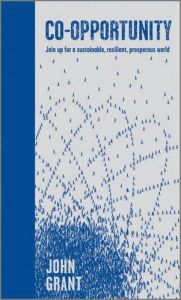Join getAbstract to access the summary!

Join getAbstract to access the summary!
John Grant
Co-Opportunity
Join Up for a Sustainable, Resilient, Prosperous World
Wiley, 2010
What's inside?
Sustainable cooperation instead of competition? It’s possible, but you will make a living, not a killing.
Recommendation
Author John Grant wants to change the world, not so that he makes money and not because the planet’s going to flame out, but because it’s the right thing to do and he’ll have fun. He asserts that the Earth can sustain everyone: There’s sufficient water and energy, and people can grow enough food. But humans ruin everything rather than replenishing the ecosystems they need. Individual citizens must recognize their stake in the Earth and take altruistic responsibility for creating a better world. In the face of devastating climate change, Grant asks, how can the lessons of marketing transform consumers – who obsess over getting more stuff for less money – into citizens who are willing to do what’s necessary to avert disaster? Though his writing style is fragmentary and convoluted, his heart and his information are clearly in the right place. If you’re ready to be a part of the solution in a post-consumer society, getAbstract says this book is for you.
Summary
About the Author
John Grant, author of The Green Marketing Manifesto, is an innovator in sustainability marketing.

















Comment on this summary